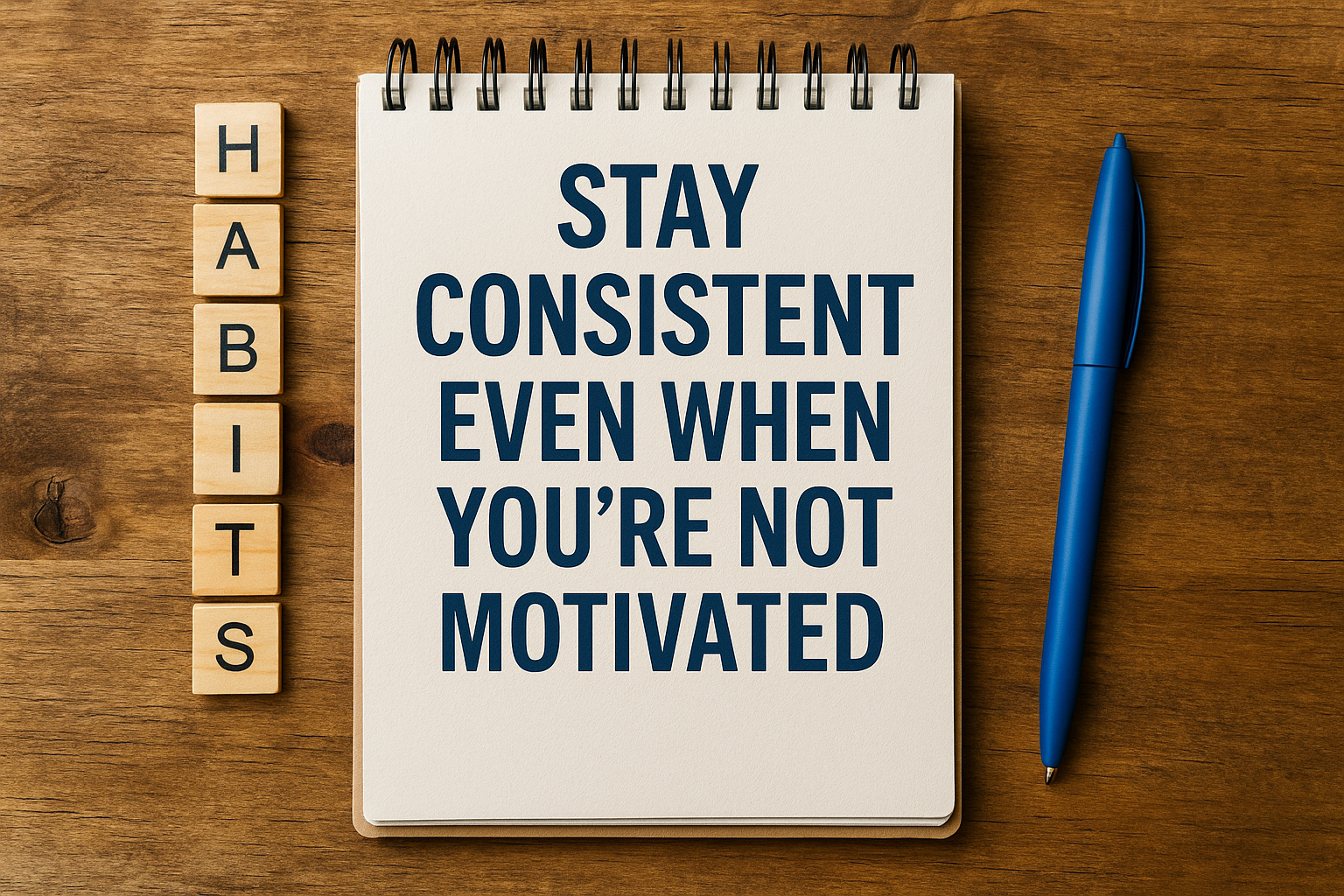Motivation feels great when it’s there—but the truth is, it’s not always reliable. You may start a project full of energy and excitement, but that drive can fade. Life gets busy. Doubts creep in. And suddenly, the habits you promised to keep start slipping.
That’s where consistency comes in.
Staying consistent, even when you’re tired, bored, or unmotivated, is one of the most powerful personal growth skills you can develop. In this article, you’ll learn how to build a system that helps you keep showing up—especially on the hard days.
Why Motivation Isn’t Enough
Motivation is a feeling. It comes and goes. It’s influenced by mood, energy, weather, sleep, and even what you eat. That means it’s a terrible foundation for habits that require long-term effort.
If you rely only on motivation:
- You’ll stop when you don’t “feel like it”
- You’ll procrastinate when things get uncomfortable
- You’ll start strong but struggle to finish
Consistency, on the other hand, is a choice, not a feeling. It’s the decision to show up anyway. And that’s where real transformation happens.
Step 1: Shift Your Identity
Instead of focusing on what you want to achieve, focus on who you want to become.
Don’t just say:
- “I want to write more”
Say:
- “I’m a person who writes every day, no matter what”
This shift from action to identity helps you stay consistent because you’re no longer just chasing a result—you’re reinforcing who you are. And when your habits match your identity, it’s easier to follow through.
Step 2: Build Tiny, Repeatable Habits
On the days when motivation is low, big goals feel overwhelming. The secret is to shrink your habit down so small that it’s nearly impossible to say no.
Examples:
- Instead of 30 minutes of reading, read 1 page
- Instead of a full workout, stretch for 2 minutes
- Instead of journaling a full page, write one sentence
This is called a “minimum viable habit.” It removes excuses, builds momentum, and keeps your streak alive.
Step 3: Use a “No Zero Days” Rule
A “no zero days” mindset means you do something—anything—to move forward every single day. Even if it’s small, even if you don’t feel like it.
Why it works:
- It removes the all-or-nothing mindset
- It keeps the habit active
- It reminds your brain: “I’m still doing this”
Progress doesn’t have to be perfect—it just has to be present.
Step 4: Create Triggers and Anchors
Consistency thrives in structure. One way to make habits automatic is to link them to an existing routine or environment.
Examples:
- Meditate right after brushing your teeth
- Write your daily goals while drinking your morning coffee
- Review your to-do list when you sit down at your desk
These anchors make the habit easier to remember—and harder to avoid.
Step 5: Use Visual Progress Tracking
Tracking your habits can be a huge motivator when discipline is low. Seeing your progress builds momentum and gives your brain a dopamine reward.
Ways to track:
- Habit tracker apps
- A calendar with checkmarks
- A journal where you note small wins
- Sticky notes or visual boards
Keep the streak alive, and let the visual proof motivate you.
Step 6: Build in Accountability
It’s easier to stay consistent when someone else knows what you’re doing.
Try:
- Telling a friend your goal and sending them updates
- Joining a community focused on the same habit
- Posting your progress publicly (if you’re comfortable)
Accountability adds a layer of external structure when your internal motivation dips.
Step 7: Anticipate Resistance and Plan for It
Ask yourself:
“What will I do when I don’t feel like doing this?”
Create a consistency plan for low-motivation days:
- Pre-write a script (“Just 2 minutes, then I can stop”)
- Keep your tools or resources ready and visible
- Schedule your habit for the time of day when you have the most energy
Planning for resistance makes it less powerful when it shows up.
Step 8: Be Kind to Yourself and Keep Going
Missing a day doesn’t mean failure. It’s part of the process. The key is to avoid guilt and get back on track as soon as possible.
Try:
- Reflecting on why you missed a day (without judgment)
- Recommitting the next day with a smaller version of the habit
- Reminding yourself: “I’m still becoming the person I want to be”
Consistency isn’t about never falling—it’s about getting up faster each time you do.
Small Steps Lead to Big Change
You don’t need to feel motivated every day to reach your goals. You just need to keep showing up. One page. One rep. One mindful breath. Over time, those small actions build trust, identity, and lasting results.
Start here:
- Choose one habit that matters to you
- Shrink it to the smallest version possible
- Commit to doing it every day this week, no matter what
- Track your progress visibly
- Celebrate your effort—not just the outcome
Motivation is nice when it comes. But consistency is what gets you where you want to go.
